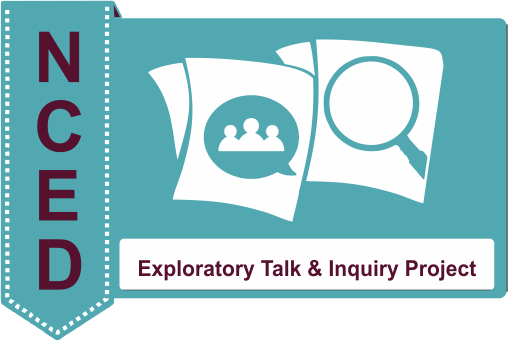Search to Investigate, Discuss to Explore

About Us
Exploratory Talk and Inquiry Project supports teachers in using inquiry-based learning in mathematics and science. The initiative advocates the use of webQuests and Exploratory talk tools in classrooms to encourage students to use collaborative inquiry methods in learning. Inquiry-based learning is mainly a culture of teaching and learning based on students’ authentic and critical engagement in the content rather than a teaching strategy. Students, within the project will assume ownership and responsibility for learning through the WebQuest and Exploratory talk framework. WebQuest allows students to utilize the use of technology to structured search and acquire information online and Exploratory talk provides students with the opportunity to discuss their findings and learn from one another. About us
The project is a collective effort and collaboration between the National Center for Educational Development (NCED) at the college of Education at Qatar University, the University of Waikato in New Zealand, Exeter University in U.K and the University of Tasmania in Australia.
Our Objectives
- Encourage students to think critically and organize knowledge in science and mathematics.
- Employ practical and inquiry experiences by using tools provided by WebQuest and Exploratory talk methods.
- Support teachers in providing an integrated vision of science and mathematics that enhances students' understanding of key concepts of both subjects.
- Provide professional development for teachers in Qatari public schools to develop their teaching abilities using inquiry-based methods.
Targeted Audience
Science and Math teachers of public schools in Qatar
Our Events
- Establishing five learning centers in the schools participating in the project. These centers will train teachers from inside and outside the school on exploratory talk and WebQuests.
- Meeting with representatives from the Ministry of Education and Higher Education to introduce the project and the mechanisms for its implementation in schools. At the end of the meeting, participants’ queries were answered.
- Holding discussion sessions led by Dr. Carol Murphy from the University of Tasmania with professional development specialists participating in the project. The discussions focused on learning centers and the project training kit.
- Presenting a model lesson by the participating teacher from Halima Al Sadia Primary School. The lesson was attended by Dr. Carol Murphy from the University of Tasmania, Dr. Nasser Mansour from the University of Exeter, Prof. Nigel Calder from the University of Waikato in New Zealand, and the National Center for Educational Development team at Qatar University, in addition to the principal and interested teachers. A feedback session on the lesson was held in the presence of everyone.
- Holding discussion sessions on the project with the National Center for Educational Development team and the team of researchers from the University of Exeter in Britain, the University of Waikato in New Zealand and the University of Tasmania, Australia.
Our Activities
- Establishing five learning centers in the schools participating in the project. These centers will train teachers from inside and outside the school on exploratory talk and Web Quests.
- Conducting meetings with representatives from the Ministry of Education and Higher Education to introduce the project and its implementation mechanisms at schools.
- Holding discussion sessions led by Dr. Carol Murphy from the University of Tasmania with NCED professional development specialists. The discussions focused on learning centers and the project's training package.
- Holding discussion sessions with the team of researchers from the University of Exeter in Britain, the University of Waikato in New Zealand and the University of Tasmania, Australia.
- Presenting a model lesson prepared by a teacher from Halima Al Sadia Primary School. The lesson was attended by representatives from the University of Tasmania, the University of Exeter, the administrative and teaching staff of the participating school, in addition to the NCED team. A feedback session on the lesson was held in the presence of everyone.